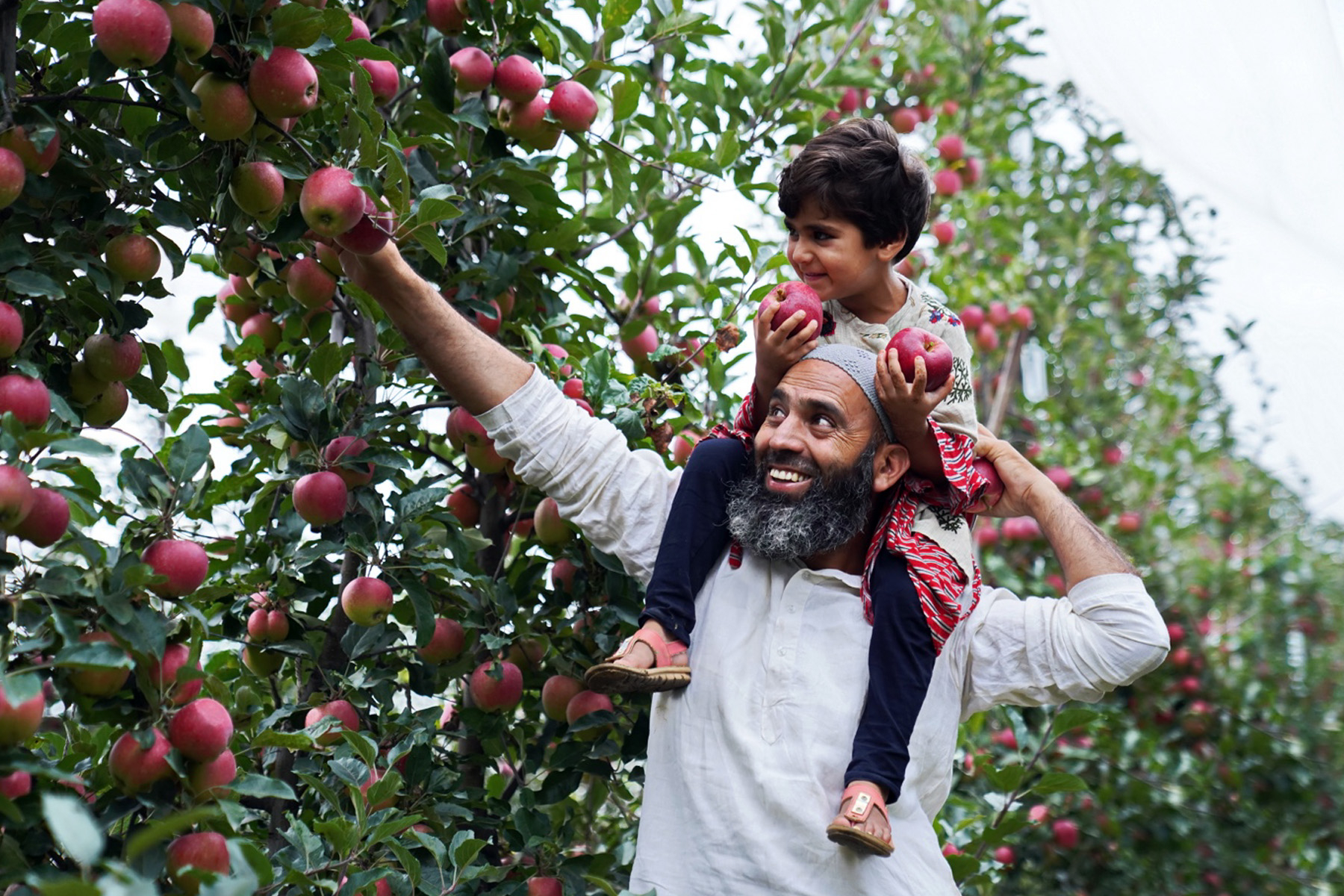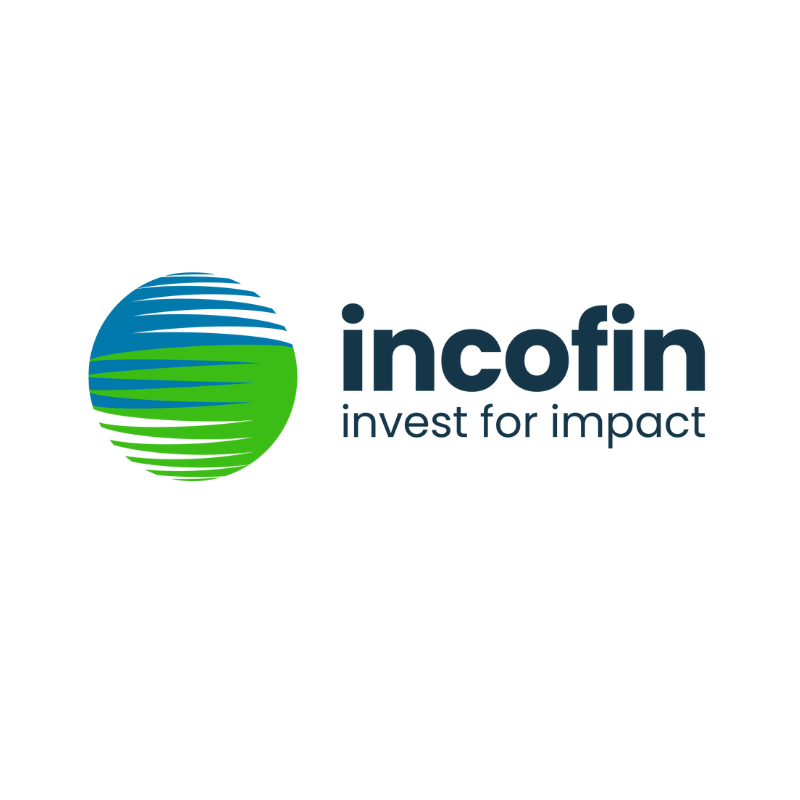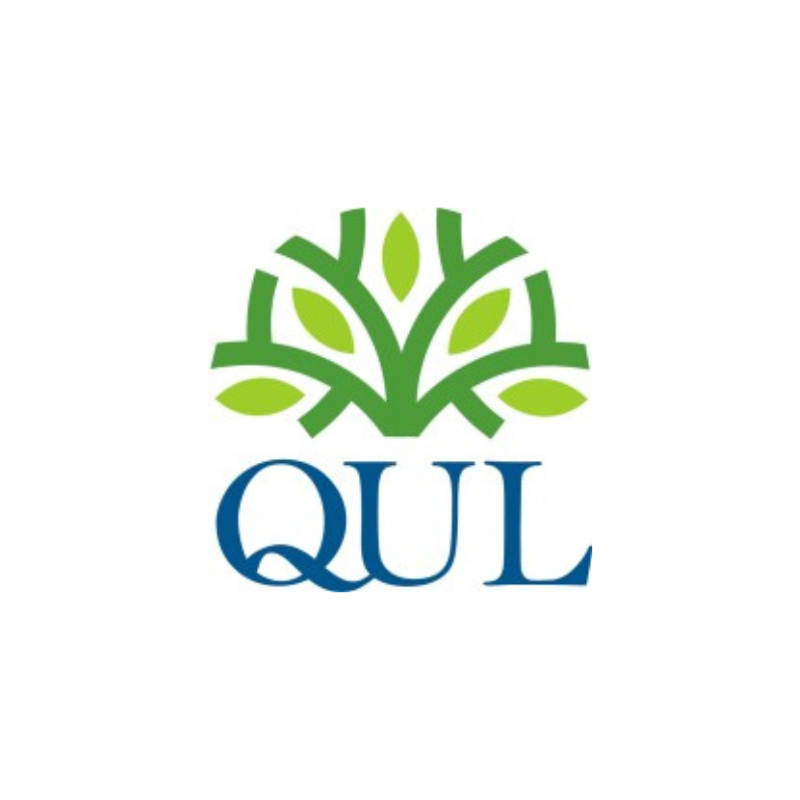Qul Fruit Wall empowers farmers at every link of Kashmir’s agricultural value chain – and keeps scaling up thanks to an investment from Incofin’s India Progress Fund.
An apple grows in Kashmir
It took sun, rain and good soil to grow this apple. Snowmelt from the Himalayas feeds the river Jhelum, so the mountains also had their role. The tree where the apple grew was one among many, planted densely in the orchard; it gathered nutrients and expressed them in what’s hanging at the end of the stem.
There is a way to pick this apple without bruising it, a way to pack it to save space but do no damage, a way to store it for crispness. There is a right time to bring the apple to the market. There is a way to get the right price, to ward away those who would interfere unnecessarily. These are ways that must be learned.
The apple is a Royal Gala – Shameema’s favourite. She grew this apple.
Shameema
“I have no father. I have no brother,” Shameema told me. We’d been speaking through an interpreter, but here Shameema switched to English to make sure she was understood. Her smile, ever-present during our call, had vanished.
No father, no brother: it’s just Shameema running the family farm. It is culturally uncommon for women to run farms in Kashmir. As the provider for her family, Shameema used to struggle to balance a second job with farm work. And in the past, the farm’s main aim was to grow enough for the family’s personal consumption.
But Shameema saw potential in her hectares. She’d heard about a new practice of high-density orchard planting. At the time, her mother was sceptical. “When the planters from Qul first came to set us up,” Shameema said, “she wouldn’t even serve them tea!”
To not serve tea, in the culture of Kashmir, meant serious distrust. And perhaps there was good reason to doubt a new horticultural practice that went against generations of how it’s been done in the region of Jammu and Kashmir (J&K). But there was also good reason to trust the people from Qul Fruit Wall (Qul), the enterprise promoting high-density orchards. Qul had strong roots in the region.
Khuram
“If you understand the culture, if you understand people, then you know you can create an impact.”
The person behind Qul – its founder and CEO – is Khuram Mir. On our call, he wore his long hair pulled back and spoke excitedly, peppering his stories with an equal measure of hard numbers and anecdotes from farmers he knows.
Born in the fruit-growing region of J&K to an orchardist father, Khuram left for Purdue University in the U.S. to study systems engineering and operations research; after that, he launched a career in tech. Apples weren’t front of mind. But systems always were.
While still in his twenties, Khuram knew he wanted to apply what he knew about systems to improving people’s lives. He thought of this when he started doing volunteer work for a food aid program in Africa; a more efficient way to deliver food means fewer people starve. A mentor steered him away from Africa. Why not go to a community you know?
Khuram quit his job in the U.S. and returned to Kashmir.
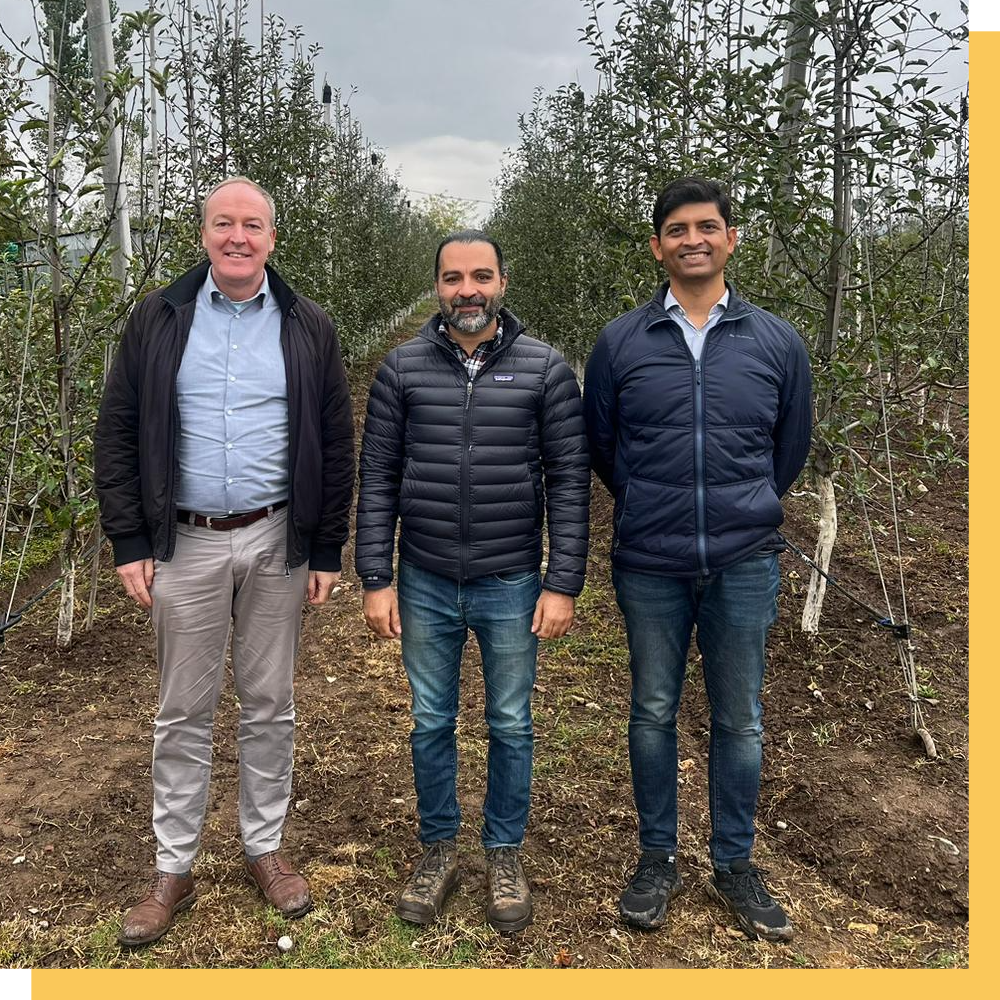
Kashmir
The region of Jammu and Kashmir sits at the foot of the Himalayas; the temperate climate is just right for growing apples. Apple farming, in fact, supports the livelihood of roughly half the population.
In 2014, however, the fruit-growing value chain in J&K was underdeveloped. Storage infrastructure was lacking. Metaphorically and literally, ‘low-hanging fruit’ was left to rot on the ground. Intermediaries in the market took a big bite out of farmers’ profits. For example, Khuram recalled a time when his father showed him the receipts from apple trading. He was shocked to find the number of commissions and middlemen involved – “they even tacked on phone charges” – and recognised quickly that this was not an efficient system, let alone one that empowered farmers.
“India is a trading country,” Khuram told the Harvard Business Review in a case study from 2014, covering the early progress of the company that would become Qul.[1] “Adding value does not come naturally to us. As an agri-entrepreneur, I want to transform the 50-year-old traditional agriculture supply chain into a farmer empowering value chain.”
This goal, while ten years old today, still holds as a mission for Qul. Since then, Qul has grown into an agtech enterprise that serves farmers from tree to market, including orchard installation, storage and digital supply chain integration with national markets. Today, five thousand farmers in the Kashmir valley have seen their livelihoods improve thanks to Qul’s services. To keep that number increasing, however, requires additional support.
Incofin’s support
In early 2024, Incofin, the Belgium-based impact investor, announced their equity investment in Qul: €5.6 million, alongside a €1.1 million investment from Fiedlin, an Indian growth capital platform for small to medium-sized enterprises (SMEs).
The investment represents a milestone not just for Qul but for the region. Back in 2014, Khuram pointed out that the political uncertainty in J&K was a top concern for outside investors, resulting in “very little development in the private sector.”[2] Incofin’s investment represents a shift in that paradigm. Qul is “the first private sector enterprise to receive global institutional capital in Kashmir,” according to Incofin stakeholders, who also commented:
“The transaction not only opens the door for more foreign institutional capital in an untapped region of Jammu and Kashmir but puts the spotlight on the tremendous potential of its horticulture industry which supports the livelihood of half of its population.”
Those livelihoods are still under pressure, said Rahul Rai, Partner at Incofin India. Rahul enumerated the main challenges for J&K’s agricultural sector:
>Outdated farming practices, resulting in inefficient usage of land and water
>Lack of processing, logistics, warehousing and cold storage infrastructure, resulting in wastages
>Unorganised systems with multiple levels of intermediaries
>Lack of access to finance and technology
Fixing each part of the system requires more than just capital. Fortunately, Rahul and the rest of the Incofin team bring a deep-seated knowledge of the impact investing landscape in India, necessary to empower Qul to do their work, and in turn empower more farmers. That know-how comes together in the India Progress Fund.
India Progress Fund
Incofin invested in Qul through their private equity investment vehicle, the India Progress Fund (IPF). The two pillars of IPF are financial inclusion and the agri-food value chain; investments support “promising entrepreneurs to increase their chances of success through patient capital, mentoring and access to a global network.”
At the launch of IPF in 2021, Incofin saw a large market- and impact potential in India. Incofin’s earlier funds had built a strong track record in India over fifteen years, including successful investments at an early stage in Fusion Microfinance and Annapurna Finance, which developed into leaders in the microfinance sector in India. At the time of writing, IPF has provided access to finance to 90,100 people, including 47,800 “new to credit” borrowers, and impacted 2.2 million farmers through its investments. This track record marks Incofin as a pioneering impact player in India.
Qul checked both boxes of the fund’s pillars: agricultural value chain and financial inclusion. Qul had already shown they were profitable and scaling. Rahul and other Incofin stakeholders were also impressed with Khuram’s strong leadership and experienced management team. But to dig further into the ‘why’ behind the investment, it’s first necessary to take a closer look at what Qul does and how they do it.
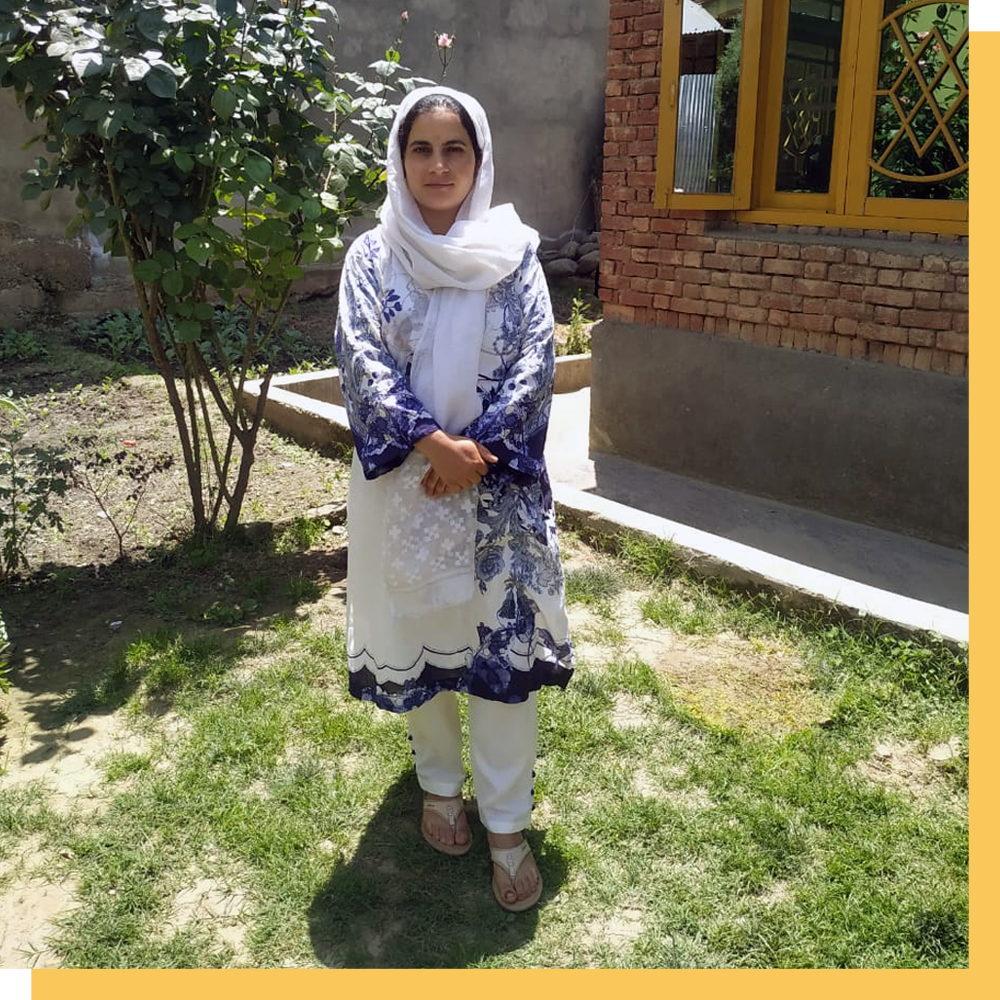
Why Qul
True to its name, which means the “universe of trees,” Qul aims to create value for farmers at every link of the chain: orchard installation and management; integrated cold chain; and marketing and distribution. The high-density orchards Qul installs, as Shameema described earlier, let farmers produce more with less work and less use of natural resources. Cold chain storage enables fruit that was wasted in the past to come to market at the right time and across the year. Qul’s technological innovation, overarching all links in the chain, includes everything from controlled atmospheric storage to misters.
According to Mursaleen Hyder, Qul’s Digital Transformation & Business Processes Lead, most of this innovation is farmer-driven: about 70% comes from farmer feedback, 30% from Qul’s internal research and development department. The overall effect is an integrated value chain for J&K’s fruit farmers that puts their livelihoods first while promoting sustainable practices, such as less wastage and less water use.
Farmers experience the tangible positive impact of Qul when they join this value chain. For example, without the high-density planting Qul pioneered in the region, Shameema’s farm would have struggled to achieve the scale necessary to bring apples to market; Shameema would have remained excluded from the market and would need to work second jobs to support her family. Throughout their journey, Qul has added many such farmer-centric services, with just as many stories like Shameema’s. The latest investment from Incofin promises yet more positive impact, with ambitious targets to match.
Potential & targets
Targeted impact, from Incofin’s perspective, connects to the U.N. Sustainable Development Goals (SDGs):
SDG 1 – No poverty: 4-6x increase in net income for farmers; increase in farmer internal rate of return (IRR) from 11% to 27%.
SDG 2 – No hunger: Increased yield per hectare from 15-20 metric tonnes per hectare to 60-80.
SDG 12 – Responsible production and consumption: 70% reduced water use; 80% reduced agri-chemical use.
SDG 15 – Life on land: 60% reduced land usage through high-density planting.
In addition, the investment in Qul has the potential to add 25,000 metric tons of controlled atmospheric storage, aiding post-harvest infrastructure; and reduce farmers’ barriers to entering the market, via Qul’s nurseries and high-density planting.
Regarding financial inclusion, Incofin stakeholders write that Qul “demonstrates a farmer-centric value system by collaborating with small and marginal farmers to strengthen their entrepreneurial capabilities.” According to Rahul, access to finance was a “key-bottleneck in the agri-food sector,” and so the investment puts a particular emphasis on bringing small and marginal farmers a proven and affordable way to join the value chain.
Market know-how informs support, as summed up by Aditya Bhandari, Regional Director and Partner at Incofin:
“Incofin has first-hand practical rural market experience. Success from microfinance shall be carried forward to the large unmet missing middle. IPF shall back entrepreneurs aiming to challenge the status quo, in the process to transform from informal to formal market setup.”
The ambitious targets of the investment reflect high hopes for empowering J&K’s farmers – hopes shared by Khuram:
“Our mission is to transform lives and improve livelihood by at least quadrupling in 5 years the apple yield from the current levels of 12 metric tonnes per hectare. Qul has plans to scale up its operations with this impact capital raised, which is socially aware and environmentally conscious, and intends to take this model to 30,000 farmers in the next few years.” Qul currently reaches 8,500 farmers.
“If Qul succeeds in achieving its goals,” according to Incofin stakeholders, “it will have enabled savings of 32 billion litres of water, direct employment of 3,500 youth in the Kashmir valley and sustainable farming in over 6,000 hectares of land.”
Judging from IPF’s previous investments, there is a sense that this investment could also have a catalytic effect. According to Rahul, “IPF has drawn the attention of private investors to underinvested sectors, like farmer-owned companies and geographies like the Kashmir valley, thereby crowding in capital and creating an impact far beyond the immediate impact delivered by its portfolio companies.”
Measuring dignity
For more than ten years, Qul has gone against the prevailing social norms of J&K by empowering women farmers like Shameema and striving for gender parity within their organisation. “Out of five major decision makers in my team,” said Khuram, “three are women. It has been a journey for me, because Kashmir is a very conservative society. They were not open for women to come to work. We changed that entirely.”
Khuram had to fight for this change. Facing vocal opposition from conservative members of the community, Khuram remained undiscouraged; he stood up for his hiring practices, convening a meeting between opposing community organisations, his team and other stakeholders. He ultimately won over the sceptics.
Gender remains a complex issue in the progressive culture of Qul, but the way Khuram has navigated these waters has inspired confidence from Incofin. After all, Incofin applies a gender lens throughout a great share of their portfolio and wants to see Qul achieve progress in this regard.
Dignity is hard to measure. But it’s also one of the most important metrics in this story. Shameema spoke about getting respect from the wider community – she still wants more. Javed, another farmer, said he no longer needs to compel others to work in the orchard – his barometer for whether the work is seen as dignified.
Shameema and Javed were very vocal in their support for Qul – and Khuram in particular. Farmers have his phone number, and there’s even a new program where he has open hours at engagement centres where farmers can visit and share whatever’s on their mind – from complaints to a cup of tea. The outpouring of support for Khuram and Qul among the farmers I spoke with was so strong, it made me feel a tinge of regret that Incofin’s team was much more unknown to them. Maybe that’s to be expected: Incofin drives change behind the scenes. And while maybe a farmer wouldn’t call them up, that doesn’t diminish the impact they made in this community. They are helping to scale a way of living that’s easier for farmers – and make Kashmir a place where dignity grows.
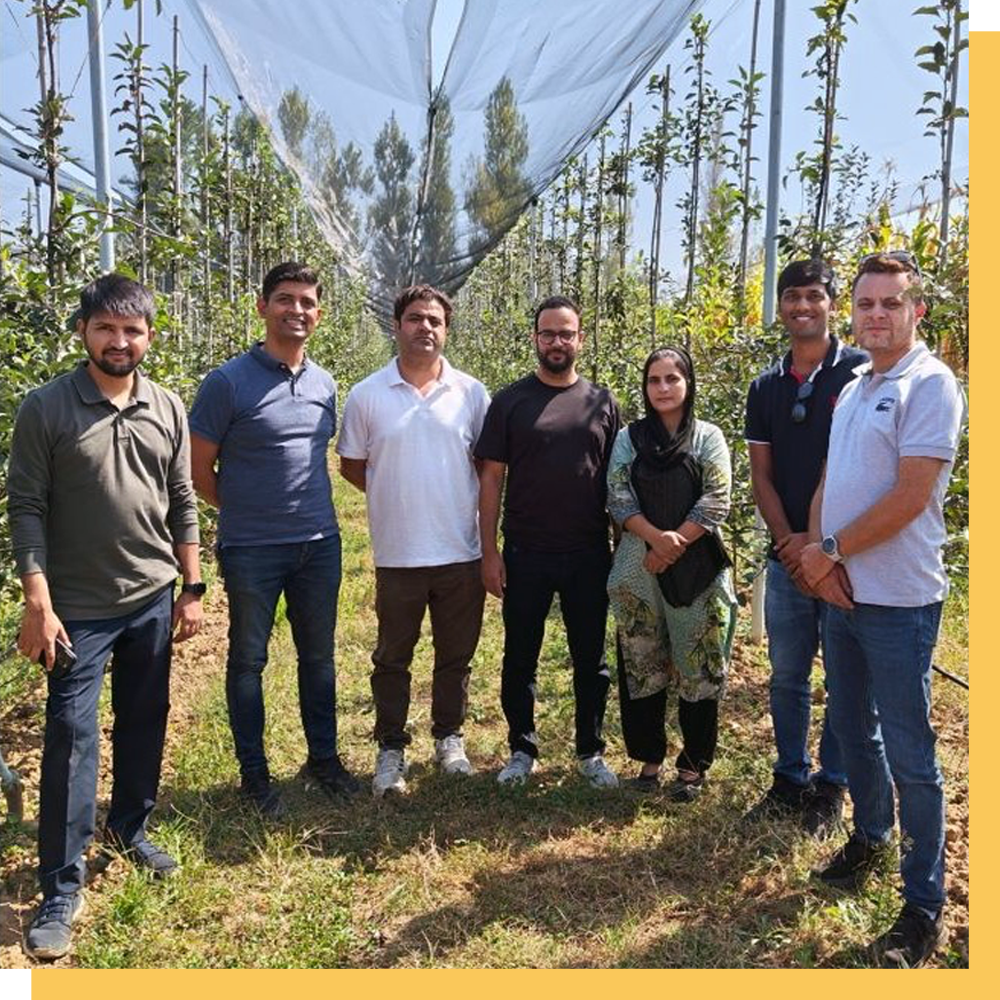
Footnotes:
[1] Alvarez, Jose B.; Raina, Anjali; Chawla, Rachna. “HN Agri Serve: Growing Prosperity” Harvard Business Review, 2014.
[2] Ibid

